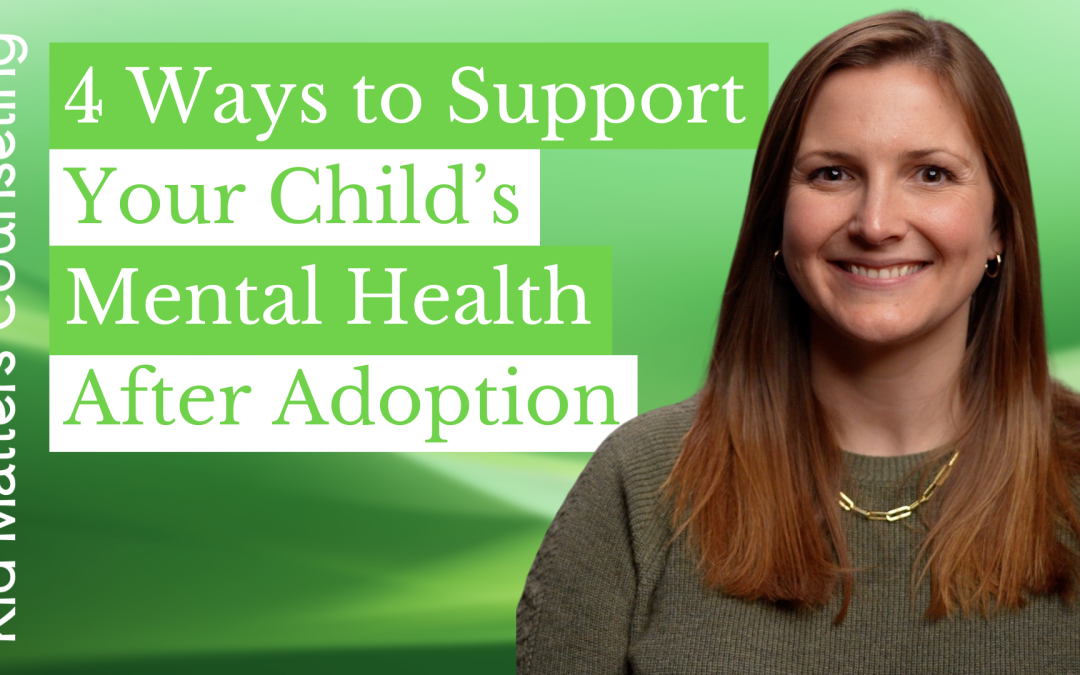Struggling with feelings of security and identity are common for adopted children. These young minds often feel caught in a whirlwind of uncertainty, craving a place where they truly belong and can be heard. Yet, with the right support and understanding, they can find their place, building a strong, loving bond with their new family.
Hi, I’m Liz Blaha, Child & Adolescent Therapist at Kid Matters Counseling, and in this article I’ll share 4 strategies to support your child’s mental health after adoption.
1. Cultivate a Safe and Secure Haven
To establish a safe and secure haven start by establishing a consistent daily routine, encompassing regular meal times, homework schedules, and bedtime rituals. Designate a personal space in your home where they feel safe and can have privacy, reinforcing their sense of belonging. Implement clear household rules and hold regular family meetings to discuss routines and address concerns, fostering a predictable and stable family dynamic.
This predictability in daily activities can offer comfort, reassurance, and a sense of security for your child.
2. Embrace Open Communication and Active Listening
Encourage them to share their feelings openly and honestly, letting them know that their emotions are valid and that you are there to listen with empathy and support.
For example: establish ‘Talk Time’ sessions. By setting aside a specific time each day or week for you and your child to have uninterrupted conversations, you provide a consistent opportunity for them to express their thoughts and feelings. This routine becomes a cornerstone of trust and openness, allowing your child to feel heard and understood.
In addition to structured conversations, regular emotion check-ins are helpful. Instead of asking broad questions like “Are you okay?“, use more emotion-specific language, such as “Are you feeling happy, worried, or something else today?“. This approach not only shows your child that you are genuinely interested in understanding their emotional state but also helps them learn to identify and articulate their feelings more precisely.
Another effective activity is establishing a family sharing circle. In this setting, each family member takes turns to share something about their day, including both positive experiences and challenges. This practice not only encourages your adopted child to express themselves freely but also sets a family culture where sharing and active listening are integral, reinforcing the idea that every family member’s voice is important and valued.
3. Celebrate Individuality and Identity
Create meaningful traditions, rituals, or activities that connect them to their birth family, honoring their diverse roots and fostering a sense of belonging. This empowering process will cultivate a strong sense of self, allowing your child to thrive emotionally and embrace their multifaceted identity.
4. Seek Professional Support
Sometimes, professional assistance can greatly benefit your child’s emotional well-being after adoption. Consider consulting a child therapist who specializes in adoption-related issues. They can offer guidance, support, and valuable tools to help your child navigate their unique emotional journey successfully.
Remember, every child is different, and the emotional challenges they may face after adoption will vary.
At Kid Matters Counseling, we recognize the unique needs of adoptive families and are committed to supporting you every step of the way. Schedule an appointment with us today and we can work together to provide the tailored support that your child deserves.

Liz Blaha
Child & Adolescent Therapist
I’m here to guide your child on a journey of self-discovery, helping them to face and understand their emotions.
New Clients Call: (855) 586-1802
Current Clients: (855) 543-7687
Ask Us Anything!
We help anxious kids and frustrated parents. We serve Hinsdale & the Western Suburbs of Chicago.
Made with ♥︎ in Hinsdale, Illinois for Chicago
Built By Brand Your Practice.
Kid Matters Counseling, P.C. DISCLAIMER: This website and blog are for informational, educational and general discussion purposes only. It is understood that no guarantee or warranty arises from the information provided, discussed or commented upon in this website and blog nor does it constitute legal or other professional advice on any subject matter. Access to this website and blog is voluntary and at the sole risk of the user. If you think that you have a medical emergency (including clinical), call your doctor or 911 immediately. A licensed medical professional should be consulted for diagnosis and treatment of any and all medical conditions. While the information contained within this website and blog is periodically updated, no guarantee is given that the information provided is correct, complete, and/or up-to-date. See our complete Privacy Policy and Terms of Service.





